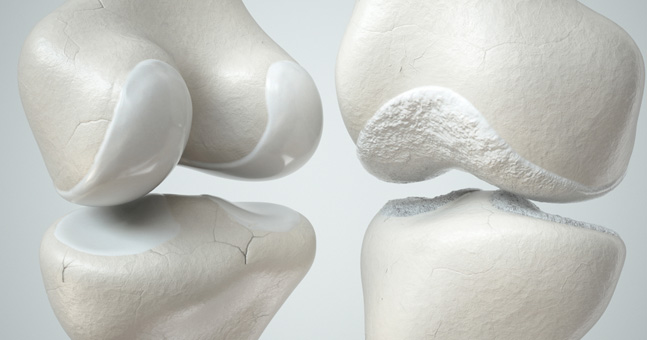
Acute knee pain is pretty common — most of us have experienced at least mild knee pain after a day of strenuous activity. In those cases, painful symptoms usually go away after a little rest and maybe an ice pack or two. Imagine having knee pain on a regular basis — or even every day. That’s chronic knee pain, and unfortunately, it’s pretty common too. Depending on what’s causing your chronic knee pain, there’s a good chance ice packs aren’t going to be enough to make it go away. Chronic knee pain usually requires a more comprehensive approach, with treatments tailored to your health history, activity level, age, and of course, the underlying problem that’s causing the pain.
What causes constant knee pain?
Constant knee pain can follow a knee injury, and it can also be caused by daily wear and tear. You bend your knees a lot — probably a lot more often than you realize. If you take an average of 5,000 steps per day (a low estimate), that’s 5,000 times you bend and flex your knee joint. Think about the number of times you stand up and sit down, get into and out of a car, and climb up or down the stairs. That’s a lot of bending, and a lot of stress on your knees.
The good news is that your knees are designed to bend. As long as your knees stay healthy, you won’t have to worry about pain. However, if any part of the knee joint gets irritated, inflamed, or damaged, you could start to feel those painful sensations creeping in. With chronic knee pain, the longer you go without medical treatment, the worse those symptoms will become.
Conditions that cause chronic pain

Knee injuries from falling, sports accidents, car accidents, and other types of trauma can cause both acute and chronic knee pain. This is especially true if you delay seeking medical treatment. It’s the same with pain from knee strain or degenerative conditions like knee arthritis. In fact, knee arthritis is one of the most common causes of constant knee pain. In arthritis, the cartilage on the ends of your leg bones starts to wear away, increasing friction inside your knee. Mild to moderate knee arthritis is usually treated with options like oral pain relievers, injections, and therapeutic exercise to reduce pain and improve mobility. More severe arthritis might require minimally-invasive surgery to repair the knee cartilage.
Sometimes, constant knee pain involves a problem with the kneecap or patella. Kneecap instability is a chronic condition that causes your kneecap to dislocate. When this happens, the kneecap slips out of its normal position in the center of your knee. Tendonitis or bursitis are two other common causes of knee pain that occur when tendons or bursae (small sacs of fluid inside the joint) become inflamed. In other cases, the pain might not be caused by your knee at all. Instead, you could have a problem with your hips, your lower back, or even the way you walk. The only way to know what’s causing your symptoms and the type of treatment needed is to schedule an office visit with Dr. Van Thiel.
When is knee pain serious?
It bears repeating – any knee pain needs to be medically evaluated to relieve symptoms and prevent further damage. Certain types of knee pain are more serious than others. For instance, if your knee pain is accompanied by swelling, tenderness, fever, joint instability, or difficulty bending or straightening the knee, you need to see us right away. Any of these additional symptoms are an indicator of a more serious issue that could quickly develop into something much worse.
Bottom line: If you have knee pain — even mild symptoms — it’s important to schedule a visit with Dr. Van Thiel. Since you use your knees for so many activities, it doesn’t take long for “minor” symptoms to become a major problem.
How do you get rid of chronic knee pain?

Dr. Van Thiel offers a variety of treatment options for chronic knee pain. As a well-respected orthopedic surgeon, he has developed some of the cutting-edge techniques being taught to restore structural elements of damaged knees.
The important thing is to make sure your treatment plan is customized to the cause of your pain, your overall health, and your lifestyle. When working with Dr. Van Thiel, his team provides this level of personalization so his patients can achieve the best possible outcome in the shortest amount of time.
Don’t let knee pain keep you sidelined. Take the next step toward better joint health, and schedule a knee evaluation at our Rockford office today.




